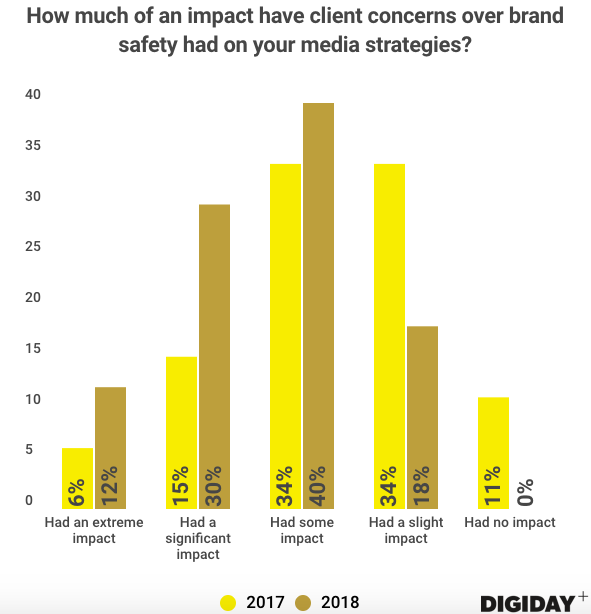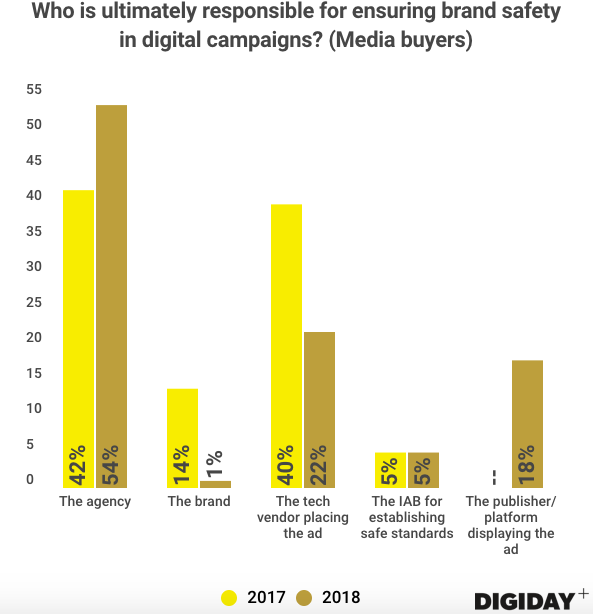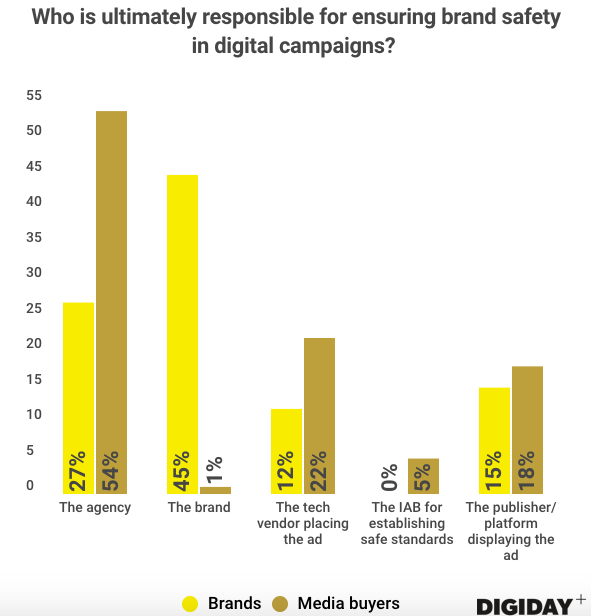
This research is based on unique data collected from our proprietary audience of publisher, agency, brand and tech insiders. It’s available to Digiday+ members. More from the series →
At the Digiday Media Buying Summit earlier this month in New Orleans, we surveyed 63 media-buying executives to learn how brand-safety concerns have affected their work. Check out our earlier research on retailers’ advertising strategies on Amazon here. Learn more about our upcoming events here.
Quick takeaways:
- Brand safety concerns have a growing impact on agencies’ media strategies.
- Over 50 percent of agency respondents believe agencies are responsible for ensuring clients’ brand safety.
Procter & Gamble chief brand officer Marc Pritchard, who famously ignited conversations about the lack of media transparency in 2017, has proclaimed 2018 as the year of brand safety. Major brands have heeded his call, and say they are taking steps to address the issue. Bank of America appointed a “brand-safety officer” to oversee its online ads, and Diageo pulled its Snapchat ads after finding they reached underage users. With this increased attention on brand safety, Digiday research found that clients’ brand-safety concerns are increasingly affecting media buyers.
Brand-safety concerns have doubled in recent months
Agency respondents to Digiday’s March 2018 survey were twice as likely to say brand-safety concerns had an extreme or significant impact on their media strategies compared to previous Digiday research conducted in October of 2017.

Brand-safety scandals seem to constantly pop up. The high-profile Logan Paul scandal on YouTube was just the latest in a string of issues for the platform, forcing the video giant to re-evaluate how it monetizes its premium creators. The ubiquitous coverage of Donald Trump could also be forcing media buyers to adjust buying strategies on behalf of their clients. Brands and their media buyers generally try to avoid Trump, with 76 percent of brands actively avoiding advertising next to Trump-related content. Even content typically deemed to be extremely brand-friendly — such as the NFL — has marketers asking questions. As one brand marketer put it: “We’ve had ads running on the NFL, and now people think we’re supporters of the protesters.”
Clients themselves are also speaking up, with one anonymous media buyer at the summit saying that “there is more sensitivity around clients’ part with digital as a channel.” It’s no surprise then that every media buyer surveyed earlier this month experienced an instance when clients’ brand-safety concerns affected their media strategy.
Media buyers take responsibility for brand safety
Over half of media buyers in Digiday’s most recent survey believe they deserve blame when clients face brand-safety complaints. Few now believe it’s the responsibility of clients to police. Although not an option in the October 2017 research, respondents to the most recent survey could select platforms and publishers that host ads as being responsible for brand safety.

By contrast, brand marketers placed more of the responsibility for brand safety on themselves when asked the same question at the Digiday Marketing Summit in December. Media buyers were also more likely than brand marketers to blame vendors for brand-safety issues. This could be because media buyers have a more thorough understanding of how these vendors and their technologies function. While some brands have been trying to move media buying in-house, many have struggled due to a lack of talent and technical expertise as well as improper valuation of media channels. While vendors have created whitelists to help buyers avoid unsafe brand placements, they are often ineffective.

More in Marketing

WTF are tokens?
When someone sends a prompt or receives a response, the system breaks language into small segments. These fragments are tokens.

AI is changing how retailers select tech partners
The quick rise of artificial intelligence-powered tools has reshaped retailers’ process of selecting technology partners for anything from marketing to supply chain to merchandising.

YouTube’s upmarket TV push still runs on mid-funnel DNA
YouTube is balancing wanting to be premium TV, the short-form powerhouse and a creator economy engine all at once.





